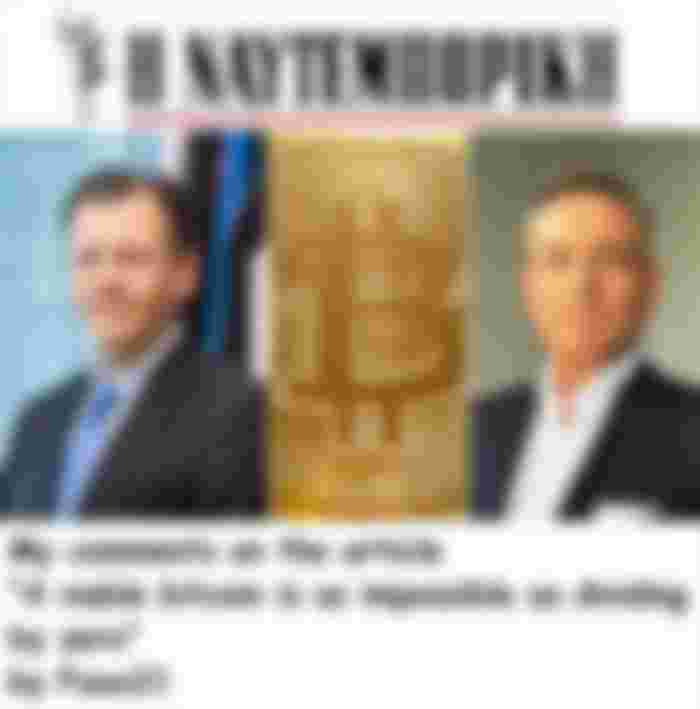
Naftemboriki.gr is the favorite business news magazine for the Greek shipowners, businessmen and traders etc as its name recalls (naftemboriki – Relevant to marine trading). It appears that recently Naftemboriki dived into the crypto world after publishing an article written by high-ranking ECB officials Ulrich Bindseil, Director General of Market and Payment Infrastructure at the European Central Bank (ECB) and Jürgen Schaaf, advisor to the same sector criticizing and "deconstructing" one by one the arguments in favor of a cryptocurrency and especially bitcoin by concluding with the statement that "A viable bitcoin is as impossible as zero division".
The article's title translated in English from Greek is "Unfulfilled Promises. Why Bitcoin can't be viable" and the greatest surprise about this article criticizing bitcoin from the ECB officials is that I tried hard to find the original English or even German version of their articles. It is also very unlikely that they have published their original article in Greek as both of the authors are Germans and the only information that I could find about them was their twitter and Linkedin accounts that brings a lot of suspicion about the true authorship of the article although in their tweets both appear to be anti-bitcoin activists and naftermboriki.gr can be considered a highly trusted source of business information in Greece. The only document that I could find about Ulrich Bindseil is an ECB published document with title: "The Eurosystem collateral framework explained".
My first job then is to provide a google translation of the article in English and I am not ashamed to mention that because I want to present the authentic article without any personal modifications in order to be as accurate as possible. I didn’t want to interfere in its presentation but make it also available to English-speaking audience on noise.cash. The following is the full text of Ulrich Bindseil and Jürgen Schaaf:
<--- Start of the Original Article --->
The "prosperity" of bitcoin continues despite repeated adversity. The success story of the most popular cryptocurrency (cryptocurrency) to date, with a market capitalization of over a year and over one trillion US dollars, is based on three promises: first, to create an effective global currency, second, to be resistant to inflation and allow even large capital gains, and, thirdly, to liberate the "individual" from the state and strengthen it. But the promises of this digital trinity are not being fulfilled. And because collective delusion has now taken on dimensions that will cause significant damage to society, interventions by legislators are becoming more and more likely. And then the paper tower will be threatened with collapse.
But let's put things in perspective: bitcoin was originally just a ploy whose economic justification seemed sham. In 2007, a then-clouded team of software developers came up with a completely decentralized accounting concept that allows electronic payments to be largely anonymous through encryption and irreversible, ie without subsequent settlement. Under the pseudonym Satoshi Nakamoto, a white paper and the source code for this "digital money" were published, and in January 2009 the first fifty bitcoins were created. Without a central authority, a global network of equivalent computers controls, monitors and stores the system and sets financial incentives for all participants to keep it running. Every few minutes, new data packets are collected in the "blockchain", in a digital payment book. Technically, a blockchain is a chain of data blocks that continues to be updated over time and is maintained as a distributed register. To prove this, computers must solve a mathematical "cryptographic puzzle" for each "block", for which a reward awaits them in the form of transaction fees and newly created bitcoin. New bitcoins are being cut by decentralized "mining" by countless users and their computers. The maximum total number of bitcoins is technically limited to about 21 million, of which just under 19 million are already in circulation.
Bitcoin is not a currency
There is now widespread consensus that bitcoin has not achieved its original goal of being a currency. Bitcoin is very volatile and very expensive to maintain so that it can fulfill the classic functions of money, namely currency, means of payment, and means of maintaining value. Providing incentives to maintain the system without central authority is inherently wasteful and costly. It can not compete with traditional market infrastructure governance. Therefore, the bitcoin business model as legitimate money can not work in the long run. The lack of acceptance by traders due to long settlement times and high fees already show that bitcoin can not be taken seriously as a means of payment except for a few small and scattered pockets. The latest major failure was El Salvador's attempt to introduce bitcoin as the second legal currency next to the US dollar on September 7th. The attempt failed at the moment, mainly because there was no acceptance from the population, and sent the bitcoin exchange rate down (loss of 15% overnight).
The technically stable "money supply" of bitcoin is also proving to be a weakness if we look at it more closely: what is being launched as a protection against inflation would inevitably lead to the trap of deflation in a growing economy. When we have deflation, falling prices tempt people to postpone less urgent markets for the future. This may make sense when it comes to one person, but when it comes to society as a whole, demand is declining and the economy is slowing down. Consolation, however, is the fact that the supposed protection against inflation through a steady supply of cryptocurrencies is false as the number of possible cryptocurrencies that can compete with bitcoin is, in the end, unlimited.
The commonly used comparison with gold is also misleading, as gold has been used in industry and had value as jewelry for centuries before anyone thought of using it as a means of storing value, an investment form or a foreign exchange stock. In addition, gold does not degenerate over time and retains its value even in chaotic conditions or in the temporary failure of digital infrastructure.
Finally, the argument that the fiat money of modern central banks has no intrinsic value is unfounded as with the deliberate departure from gold hedging, states and central banks have issued strict mandates, legal guarantees, and institutional and operating arrangements (independence, as well as loans against collateral) to be able to let go of the gold brake without losing stability.
The favorite investment of the "biggest sucker"
Because bitcoin is not effective as a means of payment, it is not competitive for legal payments and has no other intrinsic value. In addition, bitcoin produces neither cash flow nor dividends, and its maintenance is extremely expensive. No deep knowledge of financial mathematics is required - common sense is enough to realize that the price of bitcoin will sooner or later be zero.
Investors who bet on a steady increase in value because supply is limited confuse the rare with the valuable: limited quantities of any good are worth a dime a dozen - it is only the useful subjective demand that makes a good valuable. The subjective enthusiasm for bitcoin alone is not enough in the long run, especially since the following principle applies to a purely numerical chain such as bitcoin: technologies are being replaced by better technologies and newer ones are soon displacing the new ones. In fact, the relative importance of bitcoin dominating the cryptocurrency market continues to decline: while bitcoin accounted for almost 90% of all cryptocurrencies at the end of 2016, it now accounts for only about 40%.
It is therefore not surprising that the market celebrations for other cryptocurrencies are frantic, without the working hypothesis having become more convincing. The cardano doubled in value in August and climbed to third place among the cryptocurrencies behind bitcoin and ethereum. A token called avalanche tripled in value over the same period. At the same time, prices for digital photographs of rocks with laser eyes or encrypted whales skyrocket, sometimes in just a few days. And tabloids in some countries are now giving advice on investing in cryptocurrencies, just like running a local tattoo studio.
Since the value of bitcoin is not associated with any economic benefit (as it is unsuitable as a means of payment) and as the cost of maintaining this economically meaningless system is too high, the valuation of bitcoin in the market is purely based on speculation. This only works as long as the bitcoin community's illusion of its supposed benefits as a means of payment can be maintained.
You can see it from whichever side you want: bitcoin exaggeration has all the hallmarks of a speculative bubble according to the "biggest sucker" theory: value increases as there is an even bigger sucker who assumes he can sell at an even higher price some time later. But like the fact that the number of bitcoins is ultimately limited, at some point there will no longer be enough suckers wanting an ultimately useless speculative item. In the long run, the inherent lack of value of bitcoin will prevail in the market.
The illusion of freedom
Despite its financial weaknesses, there is still a vision of liberation from state control and abuse of power by central authorities. Bitcoin, with its decentralized organization, promises the emancipation of the individual and the absolute democratization of the monetary system. However, bitcoin's pseudo-liberal ambitions tend to come from privileged elites who are comfortable with the security of the rule of law, without understanding how the market works and the regulatory effect of the rule of law and institutions. Freedom needs rules, otherwise there is the threat of anarchy and the law of the strongest.
This lack of understanding was already evident in Nakamoto's (2007) White Paper. In it, Nakamoto criticized the fact that e-commerce, unlike cash, relies almost exclusively on financial institutions as trusted third parties to process payments. Irreversible transactions are not possible, he said, as disputes sometimes have to be settled through arbitration. With the possibility of overthrow, however, the need for trust increases. These costs increase the cost of transactions, reduce the minimum practical size of transactions and prevent small occasional transactions.
However, the finality of payments is an established concept, and the reversibility of payments has less to do with payment systems per se than with the objectives of civil and criminal law, namely the possibility of repaying or seizing illegally acquired funds. The fact that a payment cannot be technically reversed does not preclude the subsequent initiation of a new payment, either voluntarily or by order, in the event of compensation for example. The fact that this reversibility is costly in the case of bulk payments is not due to technology but to legal and contractual requirements.
The almost religious glorification of maximum decentralization as the best organizational form of markets reveals something similar. The fact that the economy and financial markets in developed market economies are not organized in a purely decentralized and spontaneous way, but know central institutions and structures with internal hierarchy (companies) within defined frameworks, has long been recognized in the economic literature, at least by in the era of Nobel laureates Ronald Coase and Oliver E. Williamson. Businesses and incomplete contracts help deal with uncertainty and complexity and reduce transaction costs - and are by no means the second best solution in the absence of appropriate technologies. The mechanistic rules that bitcoin seems to create are not the right solution for a changing world.
Bitcoin is also by no means as "democratic" as its community once thought, at least in the early days, but it is shaped by financial interests and strong shareholders. The mass, 75% of the addresses, holds only 0.2% of the market share. The 100 largest bitcoin shareholders hold more value than the smaller 38 million combined. In such crowded markets, the comment of a large investor with numerous followers on Twitter is enough to cause prices to slide or fireworks. This is more elitist than egalitarian. Tesla CEO Elon Musk has repeatedly commented on bitcoin, repeatedly revising his opinion, to which the price reacted violently each time.
Finally, the prospect of a borderless world is part of the pseudo-liberal fantasy that bitcoin, as a global means of payment without national jurisdiction, could cross borders - in stark contrast to conventional cross-border payments. In particular, the benefit of bitcoin would then be that people could send value across borders for free and unhindered to anyone with a bitcoin wallet. This argument does not recognize that the high cost of conventional cross-border payments is not due to the ineffectiveness of the means of payment, but to a significant extent to regulatory requirements for combating money laundering and terrorist financing. However, these requirements, compliance costs and legal risk provisions only affect the regulated financial sector. The fact that bitcoin payments have so far managed to completely escape this phenomenon is therefore a regulatory omission and not a technological achievement. But more on that below.
Possible change of attitude of the regulatory authorities
In addition to the design flaws that undermine long-term interest in bitcoin, the cryptocurrency also poses risks to society and the environment: the system is widely used for criminal activities and large-scale waste of energy. The fact that lawmakers in many countries have been watching this game for a long time does not mean that this situation will remain the same.
The development of the bitcoin market was characterized from the beginning by the manipulation of the market and the dubious activities of the operators of transactions. This is combined with the fact that a not insignificant percentage of bitcoin is used for illegal activities. Drug smuggling, money laundering, terrorist financing and extortion are the most popular areas of use, especially for cross-border payments. The relative sizes are disputed here. Some studies conclude that the use for illegal activities reaches 40-50%. Supporters of bitcoin, on the other hand, speak of a percentage of less than 1%. But this is mainly due to the fact that the denominator confuses the volume of trade with economic activity.
To the extent that the "same function - same risks - same rules" principle is to be applied to money laundering and terrorist financing and to be targeted in practice rather than in the middle, a change in the attitude of regulators is becoming more and more likely. In fact, European legislators are already moving in that direction. Otherwise, a simple feature of a computer network could bypass a central element of the global financial regulatory framework. The G20, a team of twenty major industrial and emerging economies, is currently working hard to improve cross-border payments. These are also expensive because the not always clear and globally still inconsistent application of regulatory requirements leads to high compliance costs and legal risks for legally operating companies. An overall improvement in the regulatory framework would include covering all cross-border payments and at the same time improving the clarity and applicability and, consequently, the effectiveness of the regulatory framework.
Finally, there is the giant energy waste of the bitcoin network. In June, the University of Cambridge estimated bitcoin's annual energy consumption at just under 115 terawatt hours, which is roughly equivalent to Pakistan's electricity consumption. And there is no hope of improvement on the horizon, because the insatiable thirst for energy is inherent in the system. Without an official or reliable issuer, complex decentralized control mechanisms and therefore high computing power are required, ie huge energy consumption is the inevitable symptom of the social inefficiency of the bitcoin system. Electronic means of payment issued centrally by reputable issuers are incomparably more energy efficient and therefore more sustainable, as various studies have now shown.
The threat of environmental damage as well as regulatory arbitrage, especially of illegal activities, make the government response increasingly likely. Leading global bodies, such as the Financial Action Task Force (FATF) and the Financial Stability Board (FSB), have recently unequivocally declared war on cryptocurrency.
The list of arguments against a permanent bitcoin is long. Even though no one can say exactly how much longer the ghost will be wandering, everyone is already well enough informed that they do not rely on bitcoin either as a means of payment or as a capital investment. A viable bitcoin is as impossible as dividing by zero.
<---End of the Original Article--->
It is certain that someone can find numerous articles against bitcoin especially in Medium such as the articles "Bitcoin and Ethereum Are Dead (And Their Honest Investors Know It)" and "Bitcoin is a Giant Ponzi Scheme". BitcoinGordon has made in the previous months an extensive report with his own flooding-style writing on the article "A Rational Rebuttal To An Article That States "Bitcoin and Ethereum Are Dead" on Publish0x.
Vassilis Pantazopoulos is another “popular” Greek crypto-activist, pseudo-crypto-evangelist and publisher who is also trying to earn some fiat money by publishing books about bitcoin in Greek taking advantage from the recent cryptocurrency hype and curiosity of ordinary people who are following unblindlly and without question anything about the cryptospace. Recently he has published an article on euro2day.gr/ with title "The Unfulfilled Promises of Bitcoin" and a video blog on youtube also in Greek responding to the above mentioned article written by the German ECB officials and authors against bitcoin with his "own" counter-arguments. However, the interesting thing about Pantazopoulos article (and the rest of his articles) is actually the fact that it is actually a Greek translation of the very same article published from another blogger in medium called geozee who published his original responses in the article The Unfulfilled Promises Of Bitcoin, without mentioning its original source of translation!
Since the plagiarised and translated article of Pantazopoulos that i have initially found was also in Greek, I took the initiative to translate it again, but this time blending and reinforcing geozee's and NOT Pantazopoulos counter-arguments with my opinion as well. Again due to copyright restrictions from Publish0x I won't be able to publish geozee's comments but only mine. However you can find the complete version that includes geozee's on noise.cash on the article with title "My comments on the Article A viable bitcoin is as impossible as dividing by zero". Here, I will only post the arguments of the ECB officials from their article and my comments below them. You can also find the original answers of geozee on the article The Unfulfilled Promises Of Bitcoin in Medium. Surprisingly, geozee decided to remove his article from Medium so it is no longer available.
"There is now widespread consensus that Bitcoin has not achieved its original goal of being a currency."
geozee: We fail to realize exactly where the unanimity of failure lies. They would probably gallop inside the ECB buildings. In the real world, millions of market participants, both private and institutional, not only value a trillion dollars (a monetary base value that exceeds the currencies of most countries in the world), but have been world performance champions for the past decade. If this is considered a failure, how exactly is success defined?
Feax21: For sure wealthy famous CEOs of Crypto Exchange Trading Platforms, Entrepreneurs and Hedge Funds owners have already made a fortune on fiat money from the bullish rally of bitcoin. Microstrategy’s Michael Seylor, Tesla’s Elon Musk, CoinBase’s Brian Armstrong, Binance’s CZ, Gemini’s Tyler and Cameron Winklevoss Brothers are only few of these names. However, my question is the following:
Are you into crypto only because you want to buy an expensive property or a luxury holidays in the Caribbean or even pay your fiat bills to the established centralised regime after exchanging your hardly earned and precious bitcoin with fiat money? Is the only reason for being on the crypto world to take some profit from the bitcoin value and buy something in fiat money boasting to your friends for your achievement and your investment profit? Are you in the cryptocurrency world because in fact you want to become a fiat millionaire? Is this the real vision of Satoshi Nakamoto for the establishment of a decentralised monetary system? Is your main reason for being in crypto world, only to take some profit from your cryptocurrency investment and then return on the same centralised fiat system that you have been trapped for decades but this time richer by few thousands of US Dollars printed by extra millions every year?

Or do you want to be part of a decentralised monetary revolution and stay in a decentralised monetary system of a cryptocurrency with a FIXED 21 million circulation supply without any further print and without losing your money of the inflation caused from the printing of new paper money from the decentralised monetary system of the establishment?

"Lack of acceptance by traders due to long settlement times and high fees already show that Bitcoin can not be taken seriously as a means of payment except for a few small and scattered pockets. The latest major failure was El Salvador's attempt to introduce Bitcoin as the second legal currency next to the US dollar on September 7th. The attempt failed at the moment, mainly because there was no acceptance from the population, and sent the Bitcoin exchange rate down (loss of 15% overnight)."
geozee: Bitcoin, although started by a closed circle of developers 12 years ago, has now managed to get a growing number of stores to accept cryptocurrencies as a means of payment. From shoes and digital assets to luxury homes, they sell on Bitcoin and Ethereum. In addition, many listed companies and institutions, such as insurance companies, hold Bitcoin as a percentage of their holdings.
A month ago, we had it recognized as the official currency of a sovereign state, El Salvador. The claim that its exchange rate has been falling for a month, so it failed as a venture, has the same value as claiming that Apple has failed as a company because its share price has fallen in the last month.
The other allegation that he is not accepted by the people of El Salvador is an outrageous lie. According to official data, in less than a month, the active users of the digital wallet have exceeded 2 million. Almost the same number of residents who have a bank account in the country. What the traditional banking system has accomplished in 50 years, Bitcoin technology has accomplished in a month.
Feax21: I am not aware of that “official data” about the percentage of adoption of Chivo’s, El Salvador’s digital wallet that geozee mentions either he reports its source of information but what is already known according to Reuters article with title "Analysis: Remittance firms slow to add bitcoin, despite El Salvador move" is that Bukele’s main argument for the establishment of bitcoin as a legal tender in El Salvador is that bitcoin can fight the current problem of heavy remittance fees paid from El Salvadorian who are sending their fiat money to their relatives through 3rd party money transfer providers such as MoneyGram and WesternUnion. I have published a relevant article on Leofinance with title "The Salvadorian Revolution of Bitcoin". Even better he is trying to attract in his country bitcoin professional miners who could make use of country’s volcanic geothermal natural energy to support their mining activities making bitcoin greener and fighting against the main argument against bitcoin as non-ecological as it demands huge amounts of energy for its mining activities.
https://twitter.com/nayibbukele/status/1442949756993490945
"Bitcoin's technically stable "money supply" is also proving to be a weakness, if we look more closely: what is being launched as a protection against inflation would inevitably lead to the inflation trap in a growing economy."

geozee: Wrong here too. Bitcoin is not deflationary. Its total quantity does not decrease, it increases. It just grows at a predetermined and steady rate that goes down every four years. For example, 900 Bitcoin per day are generated during this period. In the next period 450 will be created, in the following 225 etc. Unlike government currencies where no one knows how many and at what rate they will be "printed", eroding the element of rarity and being highly inflationary, Bitcoin has a maximum allowed amount. It is the 21 million coins.

Feax21: And that was a major designed financial breakthrough for Satoshi Nakamoto on the paper A peer to peer electronic cash system.
On the contrary to Bitcoin, Ethereum has no upper minting limit or circulation supply according to its whitepaper. Vitalik Buterin tried to mitigate the situation of this faulty Ethereum design by enabling the burn of Ethereum in every transaction instead of providing a reward to the ETH miners with the latest London update hoping to reduce the cost of gas fees as well but without success leading the upgrade to a huge fiasco. Other tokens are following similar policy with Binance’s BNB of the Binance Smart Chain network burning millions of BNB tokens every quarter in an attempt to keep its circulating volume low.
"Consolation, however, is the fact that the supposed protection against inflation through a steady supply of cryptocurrencies is false as the number of potential cryptocurrencies that can compete with Bitcoin is, after all, unlimited."
geozee: Here you are really speechless with the level of argument. It is as if all the ore quantities of the world are accumulated together to prove that gold is not rare, because it is an ore! As if adding all the currencies of the whole world governments, to convince that the euros in circulation are too many.
Feax21: geozee is right in his perspective but I have to admit I have similar thoughts with the ECB officials after Gary Gensler's statement that the Cryptocurrency world resembles today the "Wild West" era.
I have to say I was troubled a lot from Gensler's statement and I have to admit that this is a very good argument that is valid individually for bitcoin or for every other cryptocurrency. The difference of the cryptocurrency existing unlimited “variety” against the circulating fiat money "variety" printed by all the world’s central banks is that there is no limit in the amount of how many different cryptocurrency can exist. According to wikipedia's List of Circulating (Fiat) Currencies, currently there are 180 currencies recognized as legal tender on the United Nations including 50 pegged currencies. However according to CoinMarketCap, on 3rd October 2021 there are 6,938 different crypto coins and crypto tokens and every day more emerge without any control or regulation.

Today, anyone can create its own crypto token and be his own bank even by using the AWS platform with limited actual resources and with shady capabilities and potentials and most of them proven as scums of making easy money. Several examples are all the doge-meme style tokens with various doggy names, shiba, chiuaua, Babydoge, dogefather, doge-grand-father and the rest of doge-sh!tcoins. Today You can give any name derived of the I don’t know how many nouns and fictional names that exist in the English vocabulary make a promotion on CMC airdrop and you get rich in fiat money. As a result, SEC’s head Gary Gensler mentioned that the current crypto world is a kind of Wildcat Banking of the 1837-1865 period in various isolated areas of the Wild West USA, with thousands micro private banks minting their own currency and asking from people to buy it as the next big thing in their micro-world.
"The commonly used comparison with gold is also misleading, as gold has been used in industry and had value as jewelry for centuries before anyone thought of using it as a means of storing value, an investment form or a foreign exchange stock. In addition, gold does not degenerate over time and retains its value even in chaotic conditions or in the temporary failure of digital infrastructure."

geozee: Gold is a commodity that also functions as money, which is why it behaves like a currency. Bitcoin is exactly the same, only it is digital, intangible. Gold has done an amazing job for thousands of years. However, times have changed. We live in a world where digital applications dominate.
The solutions that worked satisfactorily in the analog era are outdated. We do not use envelopes, papers, stamps for our communication. Our work becomes much more efficient, economical, faster, with e-mails, sms, zoom. It has been proven that all digital goods that have replaced analog ones, are bigger or better. The example of informative sites is typical. No paper newspaper can compete with them, as they can immediately broadcast a news story and be read by the whole world.
Indeed, an instrument of value preservation cannot be volatile in terms of its exchange rate with other currencies. However, cryptocurrencies are in their infancy. The prices reflect the possibility that Bitcoin could achieve greater adoption in the future, so the price would be extremely higher.
As to whether Bitcoin degenerates over time, executives remain under scrutiny in Physics. The building block of Bitcoin is the bits, not the individuals. The digital world is very different from the physical, the tangible. An electron has no color, no weight, it can travel at the speed of light.
Also Bitcoin no longer needs Internet to be transferred. Even if it is temporarily suspended, the coins are lost. However, if the Internet stops working tomorrow, will the banking system be able to work? The stock exchanges? Trade; The economy; In this scenario, the smallest of our problems will be Bitcoin.
Feax21: Again I should agree with geozee. Gold is a commodity that also functions as money, which is why it behaves like a currency. Bitcoin is exactly the same, only it is digital, intangible. The solutions that worked satisfactorily in the analog era are outdated. We do not use envelopes, papers, stamps for our communication anymore. Our work becomes much more efficient, economical, faster, with e-mails.
As to whether Bitcoin degenerates over time, the ECB officials should retake a high school level exam in computer science. The building block of Bitcoin is the bits, not the atoms. The digital world is very different from the physical, the tangible. An electron has no color, no weight and it can travel at the speed of light.
Even if internet is temporarily suspended, the bitcoins kept on cold wallets or on crypto-exchange servers aren’t lost as bytes are stored in a magnetic form. Have you ever lost your data when you turn off your laptop or not? Why should you lose your Bitcoin then? However, if the Internet stops working tomorrow, will the banking system be able to continue working? The stock exchanges? Trade? The economy? In this scenario, the least of our problems will be Bitcoin. We all have seen what happened lately with the big Facebook shutdown.
"Finally, the argument that the fiat money of modern central banks has no intrinsic value is unfounded as with the deliberate departure from gold hedging, states and central banks have issued strict mandates, legal guarantees and institutional and operating arrangements (independence, as well as loans against collateral), so that they can let go of the gold brake without losing stability."
geozee: It is certain that the citizens of almost all developing countries that have a weak currency will disagree with this. The Turkish lira, the Argentine peso and many other currencies have lost 99% of their value in the last 5 years against Bitcoin. But even in the EU, how confident can we feel when the "printing" of money, especially lately, is out of control?

Feax21: I totally agree with geozee as it is certain that the citizens of almost all developing countries that have a weak currency will disagree with the above statement. The Turkish lira, the Argentine peso and many other currencies have lost 99% of their value in the last 5 years against Bitcoin. There is even countries that they don't have a national currency but they depend solely on US dollar such as Zimbabwe or Panama or El Salvador. Even in the Western World, in the USA or in EU, how confident can they feel where the "printing" of money, especially lately, is completely out of control ?
"In addition, Bitcoin produces neither cash flows nor dividends, and its maintenance is extremely expensive."
geozee: Another embarrassing argument, revealing to those who claim it an inability to understand the basic principles of money. Bitcoin does not generate cash flow, it has no interest, because it should not have. It is money, money has no interest. If I have a kilo of gold, after 10 years it will be a kilo of gold. If I have 1 million euros in banknotes, I will have the same pack later.
If I put the same amount in the bank, it might pay off (although that was no longer the case at the time of zero interest rates). But then I have no money. I have deposits. As if I lend to a state, I will have bonds. If I put my money on the stock market, I will not have money, but shares.
With Bitcoin, as with gold, you do not earn interest, dividends or coupons. However, if we go back to 1971, when we had the beginning of free fluctuations in exchange rates, the average annual return on gold was 7.5%. Much more than zero they expect to earn from the interest rate. For Bitcoin there is no need to say anything other than that it was the most profitable investment title in a decade. What to do with the interest?
Feax21: Bitcoin can be considered as digital gold by no accident. It is designed so that It can retain its value for long period of time due to its limited supply quantity to 21 millions. Keep it in a cold wallet for 40 years and it will still be there. Or you can deposit it into a bitcoin’s Savings account in one of the available crypto-exchange platforms such as Binance and you can get an annual interest on top of it.
"Common sense is enough to realize that the price of Bitcoin will sooner or later be zeroed."
geozee: Exactly the same phrase is repeated monotonously for 12 years. For 12 years Bitcoin has been dying, according to its critics. Although the truth is that lately it does not appear so often anymore. Anyone who supported Bitcoin used to be considered graphic. After so many denials, anyone who insists on the theory of the "dead" Bitcoin has started to be considered a graphic. Today it is even owned by legendary fund managers such as Tudor Jones, Stanley Druckenmiller, Murk Cuban and most recently Ray Dalio.
Feax21. Nevertheless, I believe that the above statement is highly manipulated without any specific argument to support it. Anyone can say everything. I can declare that “Bitcoin will reach 100K USDT by 2023” without any arguments to support my statement. Does it make anyone to buy more bitcoin in order to become a fiat millionaire ?
"While Bitcoin accounted for almost 90% of all cryptocurrencies at the end of 2016, today it accounts for only about 40%."
geozee: Indeed, Bitcoin is no longer alone. An entire digital revolution is taking place next to him. An entire ecosystem has been created. A network that improves the Internet, as it can also transfer values, not just information. Only an ignorant or ill-intentioned person can perceive this as negative! Bitcoin and Ethereum do not compete. Proof of this is that whenever the price of Bitcoin goes up, it drags the entire crypto market up and vice versa.
Since the value of Bitcoin is not associated with any financial benefit (as it is unsuitable as a means of payment) and as the cost of maintaining this economically meaningless system is too high, the valuation of Bitcoin in the market is purely based on speculation alone. This only works as long as the Bitcoin community's illusion of its supposed benefits as a means of payment can be maintained.
Bitcoin is not really widely used today as a payment method. It is relatively slow in daily trading. However, in Bitcoin, speed is not paramount. It was not designed to be fast. Designed to be safe and rare. Gold had similar problems. Heavy, cumbersome, could not be broken into very small pieces to exchange it for small items and was generally difficult in everyday transactions. Despite all the problems, however, people were looking for gold.
How was the problem solved? They put him in a safe and created a paper gold certificate. They created a second level, above the first. People accepted the papers because they believed that they corresponded to a certain amount of gold. The metal remained in the safes.
Something similar happens with Bitcoin. In order to dominate daily transactions it is not necessary to use the same, but a substitute for it. As for gold, there were banknotes, for banknotes, Visa and Mastercard.
How is the problem with Bitcoin solved? First of all, it is a matter of time before Visa and Mastercard (as they have officially stated) connect to our electronic cryptocurrency wallet, as they are currently linked to our bank account in euros or dollars or pounds.
Second and most importantly, second-tier digital technologies have been developed, such as the lighting network, where you can transfer money (Bitcoin, dollars, euros and more) in one second, at virtually zero cost. One version of this technology is Strike, which is the base of Chivo in El Salvador and the new micropayment transfer application from Twitter.
Feax21: Again I totally agree with geozee's reply. Only Layer-2 solutions can make bitcoin a global payment system and possibly other kind of cryptocurrencies are more suitable for this role. Ask Elon Musk, he should recommend DogeCoin.
"Despite its financial weaknesses, there is still a vision of liberation from state control and abuse of power by central authorities. Bitcoin, with its decentralized organization, promises the emancipation of the individual and the absolute democratization of the monetary system. However, Bitcoin's pseudo-liberal ambitions tend to come from privileged elites who are comfortable with the security of the rule of law, without understanding how the market works and the regulatory effect of the rule of law and institutions. Freedom needs rules, otherwise there is the threat of anarchy and the law of the strongest."
geozee: Here's why you need a strong and widely accepted Bitcoin. Not to replace government currencies, but to operate in parallel, as an awe-inspiring opponent to the arbitrariness of power. It is a way out for the corrupt elites and their leaderships, who deliberately print to reap the benefits themselves. Taking it first, they use it before the purchasing power erodes. Woe to the latter.
With a strong Bitcoin, one will not be able to easily impose capital controls or make deposit cuts, sacrificing the savings of ordinary people to protect the banking system. No central bank will be able to erode the purchase value of the currency by printing arbitrarily. By owning Bitcoin, no power can confiscate the wealth of ordinary people. Knowing that citizens have an alternative to converting their money, governments will be forced to address the problems of businesses and workers. Prioritize the creation of a favorable environment that promotes innovation.
This is why it is gaining ground. All over the world they realize the importance of owning an asset that is not under the control of any government. People are freer when they have an alternative, even if they are not interested in using it.
Feax21: I should totally agree with geozee's reply which I believe it fully reflects Satoshi Nakamoto’s Vision for an independent democratic monetary system that isn’t manipulated from “corrupted” politicians, bankers and bad actors. Having the bitcoin consensus regulated from the people and the centralised system that it was designed to avoid, would only make bitcoin part of the same centralised system that it was designed to revolt from. Then Satoshi Nakamoto would have failed and his Vision would have been faded out simply because governments and their systems are stronger in manipulating people on that direction. Then there would be no hope for an alternative monetary system and bitcoin’s value will be nullified. If freedom needs rules, these rules have been defined on the paper "A peer to peer electronic cash system". Bitcoin doesn’t need any goverment-oriented “freedom” rulebook of a corrupted & failed system.
"Bitcoin is also by no means as "democratic" as its community once thought, at least in the early days, but it is shaped by financial interests and strong shareholders. The mass, 75% of the addresses, holds only 0.2% of the market share. The 100 largest Bitcoin shareholders hold more value than the smaller 38 million combined."
geozee: Another huge lie. Out of ignorance? Deliberately? In any case, the truth is that the big "wallets" are entities, such as exchanges, institutions, funds. They all hold coins that are actually owned by tens of millions of people. We have more on the subject here.
Feax21: From my point of view this is actually a pro-bitcoin argument instead of being an argument against bitcoin and it seems that the ECB authors are contradicting their previous mentioned argument that "There is now widespread consensus that Bitcoin has not achieved its original goal of being a currency."#
I can accept that the 100 largest Bitcoin shareholders hold more value than the smaller 38 million combined confirming the power-law nature of the bitcoin distribution curve (as it is described in A.-L. Barabási & R. Albert “Emergence of Scaling in Random Networks” and at Laszlo Barabasi's book with title “Linked: How Everything Is Connected to Everything Else and What It Means for Business, Science, and Everyday Life“ Perseus Publishing March 2003) although the authors provide no specific point of reference of their argument. Personally, I don’t find it a bad thing. Yet, the authors have a made a huge mistake in what the democratic nature of bitcoin is. Bitcoin’s democracy lies on its decentralised nature and not because of the power law distribution of its holders. It means that the bitcoin consensus isn’t a right of the state-owned central bank like it happens with national fiat currency where the decisions upon the consensus is taken from the governor of every state-owned central bank or from the parliamentary majority of the government that controls him. The Bitcoin consensus comes from all the bitcoin nodes across the world as long as they avoid a 51% attack thus an attack of the 51% majority of the nodes who execute the confirmation of the transactions. So apparently the authors haven’t studied enough Satoshi Nakamoto’s paper "A peer to peer electronic cash system" or they performed a wrong translation into their native language to understand what the Bitcoin consensus and what a 51% attack are. Finally in contrast with many cryptocurrency projects, there is no governance voting mechanism of bitcoin blockchain proportional to its hodlers funds so apparently there is a confusion here from the authors what democracy means in the bitcoin blockchain. I have made though a similar remark on my article "
A critical eye on FORTH Token Big Sellout" about the emergence of FORTH tokens whales who can govern the AMPLEFORTH ecosystem through its governance mechanism.
"In addition to the design flaws that undermine the long-term interest in Bitcoin, the cryptocurrency also poses risks to society and the environment: the system is widely used for criminal activities and wasteful energy on a large scale."
geozee: We have repeatedly stated why this is a weak and hypocritical argument. Nevertheless, it is used constantly! And yet, only those from another planet do not know that money laundering is done by traditional banks.
Indeed, in the early years, Bitcoin was largely used illegally. It should not seem strange to us. Often a new technology is adopted by criminals, in an attempt to find a step ahead of law enforcement. The first to use cell phones were the illegal ones. Most of the material circulating in the early years of the Internet was controversial or completely illegal activities that took advantage of the legal gray area. It is well known that many of our life-changing inventions were started for military purposes, such as atomic energy.
The point is, in the beginning neither the law enforcement nor the outlaws were well aware of the characteristics of Bitcoin. But today they know. No serious criminal leaves traces that last forever. He will prefer cash that is undetectable. The use of Bitcoin is an unexpected gift for law enforcement authorities, as there is no way the data will be erased or altered. Never!
Feax21: Without having any proof, it is possible that in the early years of bitcoin existence, the blockchain has been used by criminal organisations in order to “hide” their illegal funds. However, since today all bitcoin transactions are visible on blockchair nobody can escape and certainly nobody can liquify any crypto assets into fiat money without providing any KYC verification. So It has become amazingly difficult for criminals to liquify their digital assets into their preferred form of fiat money as cash without being identified.
Moreover, renewable energy is being extensively used today for the power supply of the bitcoin mining farms and the latest example is the installation of a bitcoin mining container in a volcanic geothermal energy factory in el Salvador by the state’s President Nayib Bukele.
"everyone is already well-informed enough not to rely on Bitcoin as a means of payment or as a capital investment. A viable Bitcoin is as impossible as dividing by zero."
geozee: What's the zero division has to do with Bitcoin, only they know! One thing, however, we agree with the argument of high-ranking officials: that it is revealing and at the same time scary. It is revealed to us in all its glory how irrelevant many of those who hold high positions in the banking elite are. Because if it is not, then they are deliberately distorting the truth.
In any case, ignorance is not an excuse. When someone in a position of responsibility deliberately refuses to investigate, to learn, he is not entitled to consider his mistake unintentional. It is difficult not to suspect that he is trying to deceive deliberately, obviously driven by selfish interests.
Why do we consider that their intervention serves selfish interests? Imagine for a second you were transposed into the karmic driven world of Earl. If consumers will be able to shop from the stores, without merchants being charged 1-2-3% of transaction costs that currently go to banking institutions and cards.
Perhaps this explains many of the nonsense that senior executives tell us. They remind us of the argument of the professions related to horses, against the use of the car. As in that case, so here, we are a little interested in their opinion now.
The world changes without them. And the Internet, in the early years of its existence, had many skeptics who, over time, disappeared. The same will happen with Bitcoin and the ecosystem that has been created around it.
Feax21: As a final conclusion, I would possibly agree with geozee that the publication of this negative article about bitcoin from high ranking ECB officials it is a little bit weird and suspicious. While their boss Christine Lagarde has been open in investigation about an ECB Euro-pegged Digital Currency according with an article on Boloomberg with title "Lagarde says the ECB Governing Council will make a decision on a digital currency by mid-2021.", why her high-ranking ECB colleagues are becoming so critical over bitcoin and blockchain technology? When today there are so many blockchain-oriented organizations from well-known and established entrepreneurs as mentioned above, certainly nobody can claim that A viable Bitcoin is as impossible as dividing by zero."
References:
Linkedin Accounts: Ulrich Bindseil and Jürgen Schaaf
Twitter Accounts: Ulrich Bindseil and Jürgen Schaaf
Bitcoin and Ethereum Are Dead (And Their Honest Investors Know It)
A Rational Rebuttal To An Article That States "Bitcoin and Ethereum Are Dead
Analysis: Remittance firms slow to add bitcoin, despite El Salvador move
https://twitter.com/elonmusk/status/1340590280848908288?lang=en
Lagarde says the ECB Governing Council will make a decision on a digital currency by mid-2021.
https://www.princess.com/learn/cruise-destinations/caribbean-cruises/
Publish0x Blockchain stories on [Crypto-monkey] (https://www.publish0x.com/crypto-monkey)
My Censored Blockchain stories on [Read.Cash](https://read.cash/@feax21)
My Cryptoarticles on [LeoFinance](https://leofinance.io/@feax21)
On [Noise.Cash](https://noise.cash/u/feax21)
Social Crypto-networking on [Torum](https://www.torum.com/u/feax21)
Follow me on [Twitter](https://twitter.com/feax31)
Follow my [cryptoblog](https://cryptomonkey.weebly.com/)







